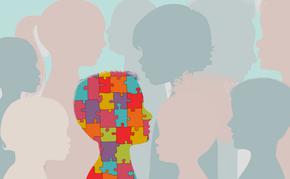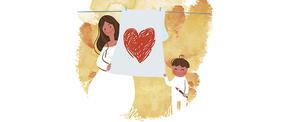The views expressed in our content reflect individual perspectives and do not represent the authoritative views of the Baha'i Faith.
A few years ago I discovered a terrific Turkish TV series with English subtitles, and in the process I learned something about myself – ever since then that is all I want to watch.
I’ve practically stopped watching TV or American movies – which I used to love, too – but now, every time I watch an American movie in an airplane or on my subscription service, I feel appalled. Why? Because so many of them seem saturated with way too much sex and violence.
I’m no prude, so this took me by surprise. Interestingly, I had not felt that way before. I was aware that filmmakers purposely add nudity, sex, violence and profanity as attention grabbers, aiming to appeal to the lower nature and instincts that humans are naturally drawn to, but I just accepted it as normal.
However, I’ve now begun to realize that I’ve been “culturally conditioned.” Have you heard of this before? It can affect all of us, no matter which culture we call our own. Cultural conditioning is defined as:
The social process in which authority figures such as parents, professors, politicians, religious leaders, peers, and the media define our cultural values, beliefs, ethical systems, and ultimately the way we perceive ourselves in the world.
The greatest danger of cultural conditioning: it inhibits our capacity for critical thinking.
In every society, people often just follow the accepted social norms and standards without questioning them. In many cases following some social standards is harmless, such as celebrating the holidays of the culture we live in. However, some cultural conditioning comes from motives like greed or profit, appealing to our fears and desires, aiming to sell us something by appealing to our egos and to our desire for instant gratification.
Ideally though, the first essential of social life is that individuals should become capable of discerning the true from the false and right from wrong, and of seeing things in their true proportions. Open-mindedness and humility are required to not fall for cultural conditioning.
The primary principle of the Baha’i teachings asks each and every person to avoid cultural conditioning, a herd mentality, and just doing something because everyone else does it. Essentially, Baha’is try to think for themselves, conducting their own independent investigation of the truth. Praising those who do think independently, Abdu’l-Baha wrote:
… ye have investigated the truth and have been freed from imitations and superstitions … ye observe with your own eyes and not with those of others, hearken with your own ears and not with the ears of others, and discover mysteries with the help of your own consciences and not with those of others. For the imitator saith that such a man hath seen, such a man hath heard, and such a conscience hath discovered; in other words he dependeth upon the sight, the hearing and the conscience of others and hath no will of his own. – Abdu’l-Baha, Selections from the Writings of Abdu’l-Baha, p. 29.
Baha’u’llah, in a tablet to some Baha’is from Zoroastrian backgrounds, wrote:
O ye sons of intelligence! The thin eye lid prevents the eye from seeing the world and what is contained therein. Then think of the result when the curtain of greed covers the sight of the heart!
O people! The darkness of greed and envy obscures the light of the soul as the cloud prevents the penetration of the sun’s rays.
So I decided, after reflecting on my own cultural conditioning, to resist. I thought: if I don’t want a society that practices violence and sexism, then I should practice getting rid of those things in my own life first, and stop patronizing the cultural norms that support them.
Here’s one example – as a Baha’i I don’t drink alcohol, in a culture where it has become common practice. As a young adult, and even as a grown woman, I’m often teased, questioned and made fun of by others for making that choice – but I’ve always known, deep in my heart, that there is no logical reason or need for me to drink. The Baha’i teachings ask every Baha’i to abstain from alcohol, but besides that, this recommendation made logical sense to me. Abstaining helped me recognize that if I were to submit to peer pressure to drink alcohol it would purely be due to cultural conditioning, not what I believed to be right or necessary. This Baha’i quote helped guide me:
O Son of Spirit! Ask not of Me that which We desire not for thee, then be content with what We have ordained for thy sake, for this is that which profiteth thee, if therewith thou dost content thyself. – Baha’u’llah, The Hidden Words, p. 8.
So how do we know if some of our beliefs and habits come from cultural conditioning? It is definitely not easy!
Whenever I’m faced with cognitive dissonance – when my practices and behaviors seem to differ from my ideals – I try to seize the chance to change. Instead of evading thought and confrontation, at that point I start my own independent investigation of the truth:
God has given man the eye of investigation by which he may see and recognize truth. He has endowed man with ears that he may hear the message of reality and conferred upon him the gift of reason by which he may discover things for himself. This is his endowment and equipment for the investigation of reality. Man is not intended to see through the eyes of another, hear through another’s ears nor comprehend with another’s brain. Each human creature has individual endowment, power and responsibility in the creative plan of God. Therefore, depend upon your own reason and judgment and adhere to the outcome of your own investigation; otherwise, you will be utterly submerged in the sea of ignorance and deprived of all the bounties of God. – Abdu’l-Baha, The Promulgation of Universal Peace, p. 289.
Once I start to recognize areas where I’ve been culturally conditioned vs. what I know as right and seemly, I activate my inner vision and learn to see beyond what society presents as the norm. I also use prayer, meditation and reflection, all very powerful tools for resisting cultural conditioning. Turning towards God and the divine light gives me guidance and enables my inner vision to recognize and distinguish right from wrong. Finally, in passages like these, daily prayer and reading the Baha’i writings helps protect me from vain imaginings and the pitfalls of cultural conditioning:
Shield Thy trusted servants from the evils of self and passion, protect them with the watchful eye of Thy loving-kindness from all rancor, hate and envy, shelter them in the impregnable stronghold of Thy care and, safe from the darts of doubtfulness, make them the manifestations of Thy glorious signs … – Abdu’l-Baha, Baha’i Prayers, p. 134.
O Son of Dust! Blind thine eyes, that thou mayest behold My beauty; stop thine ears, that thou mayest hearken unto the sweet melody of My voice; empty thyself of all learning, that thou mayest partake of My knowledge; and sanctify thyself from riches, that thou mayest obtain a lasting share from the ocean of My eternal wealth. Blind thine eyes, that is, to all save My beauty; stop thine ears to all save My word; empty thyself of all learning save the knowledge of Me; that with a clear vision, a pure heart and an attentive ear thou mayest enter the court of My holiness. – Baha’u’llah, The Hidden Words, p. 25.
You May Also Like
Comments

















― Kabir Helminski, Living Presence: A Sufi Way to Mindfulness & the Essential Self